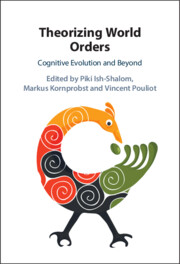Book contents
- Theorizing World Orders
- Theorizing World Orders
- Copyright page
- Dedication
- Contents
- Tables
- Preface
- Note on the Cover Image
- 1 Cognitive Evolution and World Ordering
- 2 Power in Communitarian Evolution
- 3 In Consideration of Evolving Matters
- 4 The Phenomenology of Cognitive Evolution
- 5 Narratives in Cognitive Evolution
- 6 Cognitive Evolution and the Social Construction of Complexity
- 7 Refugees and Their Allies as Agents of Progress
- 8 Holding the Middle Ground
- 9 Conclusion
- References
5 - Narratives in Cognitive Evolution
The Importance of Discourse in Meaning-Making Processes
Published online by Cambridge University Press: 18 November 2021
- Theorizing World Orders
- Theorizing World Orders
- Copyright page
- Dedication
- Contents
- Tables
- Preface
- Note on the Cover Image
- 1 Cognitive Evolution and World Ordering
- 2 Power in Communitarian Evolution
- 3 In Consideration of Evolving Matters
- 4 The Phenomenology of Cognitive Evolution
- 5 Narratives in Cognitive Evolution
- 6 Cognitive Evolution and the Social Construction of Complexity
- 7 Refugees and Their Allies as Agents of Progress
- 8 Holding the Middle Ground
- 9 Conclusion
- References
Summary
This chapter argues that one of the main lacunae of Emanuel Adler’s cognitive evolution framework is its lack of engagement with discourse as participating in meaning-making processes. It starts with a demonstration of what is arguably the most important contribution of the cognitive evolution framework: a becoming ontology. It then explores how adding narratives as a discursive process of becoming could strengthen this ontology. Cognitive evolution and narratives are complementary because they both rest on a becoming framework, so adding the latter has the potential to strengthen Adler’s theory, as well as its usefulness to guide empirical research. It uses the case of the World Bank and participatory development practices to demonstrate the importance of narrative in cognitive evolution and collective learning processes.
- Type
- Chapter
- Information
- Theorizing World OrdersCognitive Evolution and Beyond, pp. 107 - 133Publisher: Cambridge University PressPrint publication year: 2021



